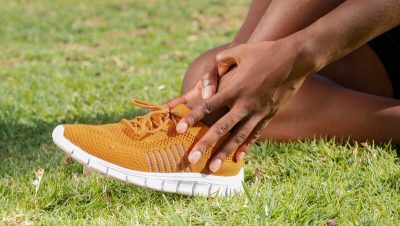 Plantar Fasciitis is one of the most common foot-related pains and conditions attended to by specialists. This condition is characterized by the inflammation of the tendon running over the heel, underneath the foot. Most commonly found in patients that frequently run, and also in patients who are overweight or obese. This indicates that strain and impact force plays a key role in the development and worsening of this condition.
Plantar Fasciitis is one of the most common foot-related pains and conditions attended to by specialists. This condition is characterized by the inflammation of the tendon running over the heel, underneath the foot. Most commonly found in patients that frequently run, and also in patients who are overweight or obese. This indicates that strain and impact force plays a key role in the development and worsening of this condition.
The team of expert Podiatrists at the Foot and Ankle Specialists of Illinois specialize in the diagnosis and treatment of all foot and ankle-related conditions, diseases, and injuries. Our team has decades of combined experience and can help you resolve any foot and ankle issues that may be troubling you. Our team is standing by to schedule you for an initial consultation for a professional diagnosis today. Don’t let foot pain stop you from living life!
Risk Factors & Prevention
Plantar Fasciitis can develop without an obvious cause, however, there is a list of risk factors that can increase the likelihood of developing this condition. They include:
- Age – common between the ages of 40 and 60.
- Strenuous exercises – long-distance running, ballet dancing and aerobic dance — can contribute to the onset of plantar fasciitis.
- Foot mechanics – Flat feet or a high arch affect weight distribution and can lead to plantar fasciitis.
- Obesity – Excessive weight places strain on the feet
- Standing Occupations – hours spent walking or standing on hard surfaces without rest, commonly factory workers or tradespeople.
Plantar Fasciitis Treatment Options
There is a wide range of treatment modalities, which one is most effective and beneficial to you is determined by how advanced your current condition is.
Medications
Pain relievers such as ibuprofen (Advil) and naproxen sodium (Aleve) can help ease your pain and bring down the inflammation associated with plantar fasciitis.
Lifestyle & Home Remedies
To reduce the pain of plantar fasciitis, try at-home tips:
- Take action to maintain a healthy weight
- Wear supportive shoes – buy shoes with a low to moderate heel and good arch support.
- Give your feet a break – low-impact sports, such as swimming or cycling
- Apply a cold compress – 15 minutes, 3 or 4 times per day to help reduce pain and inflammation.
- Stretch your arches – simple home exercises can stretch your plantar fascia, Achilles tendon and calf muscles.
Therapeutic Plantar Fasciitis Treatment
Physical therapy or using special devices might relieve symptoms.
- Physical therapy – includes specific exercises to stretch the plantar fascia and Achilles tendon.
- Orthotics – you may be prescribed store-bought or FASI Podiatrists may custom-designed orthotics to help evenly distribute the pressure on your feet.
- Walking boot or cane – for a specific period of time, to keep you from moving or placing your full weight on your foot to prevent aggravating and inflaming it.
Surgical Treatment & Injections
If more-conservative measures aren’t working after several months, your health care provider might recommend:
- Injections – Injecting steroid medication into the tender area can provide temporary pain relief.
- Surgical Treatment – this is always a final resort, FASI Podiatrists will detach the plantar fascia from the heel bone only if your pain is severe and other treatments have failed. This procedure is minimally invasive and often done under local anesthesia.
Plantar Fasciitis Treatment Available in Algonquin, IL
If you are suffering from chronic or acute foot pain, the best thing you can do is reach out to the expert Podiatrists at the Foot and Ankle Specialists of Illinois. Foot pain is often an indication that something is wrong; whether that is too much strain, improper footwear, trauma, or the onset of a foot condition. Early diagnosis makes treatment and recovery that much easier!
Call our office to speak with a member of our team or schedule a consultation online today!

